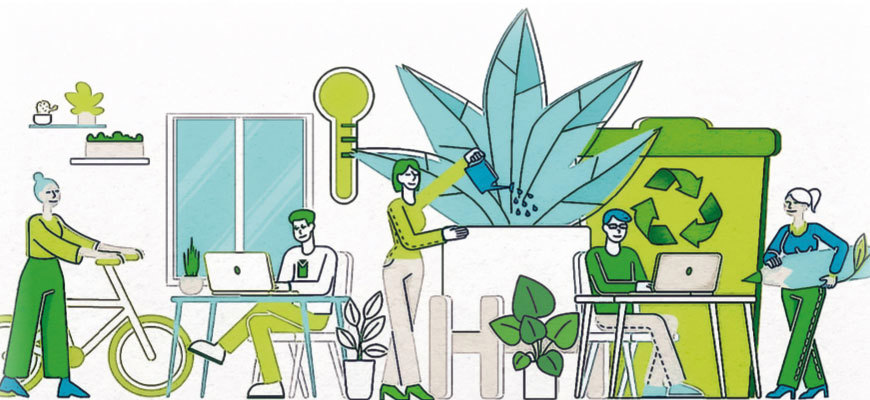Steps to turning green

As the climate emergency takes centre stage, employees and clients are putting a premium on sustainability. Firms have a professional duty to respond to the crisis, but those with strong environmental credentials also stand to gain a significant competitive advantage. Along with the cost-saving efficiencies born from increased sustainability, recent studies show employers fully engaged with sustainability attract and retain top industry talent. However, there is no place for greenwash. Sustainability must be embedded into the culture of a firm, with authenticity and genuine commitment.
People drive change, so the first step on any sustainability journey is the formation of an enthusiastic and empowered green team. This can take many forms, depending on the size and focus of the business, but is essentially a group of committed employees actively engaged in advancing sustainability in the workplace. The team will normally focus on operations and engagement, typically bringing forward and managing initiatives to lessen the environmental impact of day-to-day processes, as well as fostering an ethos of sustainability within the organisation.
Make no mistake – this is not an easy task. There are challenges on the path to sustainability, most notably creating a team of motivated people and maintaining their momentum. Here are some tips to get underway.
Build the team
Twelve is considered a maximum size for group functionality, as too many people can lead to difficulties in terms of discussions and decision making. Naturally, the formation of a green team will attract likeminded people interested in the environment, but diversity is the true key to success. A friendly recruitment email should aim to attract employees from across all departments, encouraging people who aren’t necessarily knowledgeable about sustainability to take part. A keen interest is the most important qualification! For the green team to be truly effective, the support and direct input of senior management is critical. Having a partner on the team, for example, streamlines decision-making, enhances accountability and adds a relevant commercial slant to proceedings.
What about structure?
As with any team, good communication and collaboration are fundamental, so a comfortable approach within the group will yield optimum results. For most people, sustainability will be new territory, with brainstorming being a regular feature in meetings. Everyone is finding their way through the climate crisis, trying to discover the best route to take. With an openminded and organised leader at the helm, other members can take on specific roles if they have the expertise or are suitably motivated. Depending on working patterns, think about the most effective manner to meet, and take a hybrid approach if this is most suitable. Monthly meetings will keep everyone in touch and ensure tasks progress at a healthy pace, with subgroups coming together for specific projects if needed. Prepare agendas, track action points and remember to highlight achievements – being part of the green team should be fun and rewarding.
Find your starting point
Change always comes from a fixed point, so assessing where the workplace currently stands in terms of sustainable practice is the first undertaking for any green team. Benchmarking can take many forms: instructing an energy audit, waste assessment or supply chain appraisal are excellent places to begin. There are plenty of free online tools available to complete these evaluations. A carbon calculator can also be helpful to identify areas where the business is producing the highest emissions, with energy use and business travel being the most common offenders. Embarking on a more sustainable future is a worthy cause, and there is no judgment to pass on businesses that have few environmental positives in situ in the early stages. Don’t be disheartened at the results of your initial findings – the point is to improve.
Stepping stones
Moving towards a more sustainable future can be daunting. To ease the transition, following on from the opening metrics, select the most obvious action points, bearing in mind that even the smallest steps can make a big difference. Choosing the most manageable areas to address will produce easy wins, boost morale within the team and encourage more sceptical colleagues to join in. Low hanging fruit is often found in energy consumption, recycling and printer use. Introducing reusable water bottles and keep-warm cups for staff is worth considering, as is shutting down all computers fully overnight. When the simpler options are realised, more ambitious plans can be identified and implemented, to engage fully with the crisis. And remember, sustainability is not solely about environmental protection: social justice is an integral facet of the concept. Aligning with a worthy community project will reap rewards for everyone involved and build meaningful relationships to last many years ahead.







